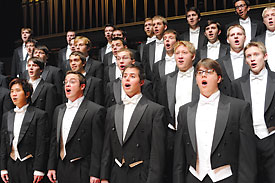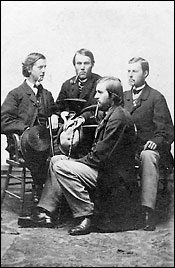It was true in 1859 as it is today: Joining fellow classmates in song and camaraderie can make for a rich university experience.
It can also make you feel like a rock star.
“During the concert they would come up to the front like we were rock stars and they were screaming. You would have thought we were the Rolling Stones,” Men’s Glee Club alum Rich von Luhrte recalls of a late 1960s Glee Club concert in Tokyo.

Men’s Glee Club members and alumni will celebrate the club’s past and present at the 150th Anniversary Concert at 8 p.m. Saturday at Hill Auditorium. It will feature the world premiere of “Searchlight Soul” by William Bolcom, recently retired School of Music, Theatre & Dance faculty member and Pulitzer Prize and Grammy winner. “The students got very much involved wanting to be on the ground floor of a new piece,” Bolcom says.
“The Men’s Glee Club provides a musical and social home for members during their college years. I’m guessing many would identify MGC as the group with which they most strongly identify at U-M,” says Director Paul Rardin, associate professor of music in the School of Music, Theatre & Dance.
Lee Quackenbush, a junior and business major who serves as the club’s public relations manager, says, “Outside of the four hours of rehearsal each week, we play on (intramural) sports teams together, take classes together, study together and often live together. My favorite activity which we do together is our weekly trips to the Cottage Inn, every Thursday after rehearsal. These memorable nights of loud singing and laughter are certainly one of my favorite aspects of club.” He also cites the tradition of older singers mentoring younger members.
Warming up
Club alumnus Jamie Turner recalls spotting Glee Club fliers announcing auditions in mail slots in South Quad during his first week as a freshman in 1975. “I hadn’t even gone and rented a room refrigerator yet,” he says.

“When you’re a freshman, you don’t know if you have a common interest with anyone; there are all the insecurities of youth. I was involved in music in high school both in the band and as a choral student, so I thought the Men’s Glee Club would be great way to get to know the university.”
Turner says he immediately went from feeling alone to having 60 friends. “One of the great things about the Glee Club is historically it’s a great cross section of the university,” he says. “There are engineers, medical students, law students and everybody else, if you’re proficient enough to survive the audition.”
At auditions, students are evaluated for their range, tone and intonation, and sight-reading abilities.
Now club historian, Turner says another attraction was the club’s accomplishments including four world championships for male chorus performance — the most recent in 1978 at Cham llangollen, Wales.
Social benefits
The Glee Club’s origins are traced to 1859 when the four-member student Quartette Club, a group of singers, would join the slightly larger Le Sans Souci (French for “carefree”) club of musicians for music making, the sharing of spirits and general camaraderie. Photos of the club members showed them in formal dress; this tradition continues today. “It is an impressive way to look,” Turner says. “Who are you trying to impress? Your parents, your friends and anyone you’d want to be around socially.”
“A remark that would perhaps be of some interest to future glee clubs and might be of some incentive, is that almost always the majority of their audience was composed of young ladies,” the Michigan Chronicle reported on June 29, 1870, the year women began attending U-M. A press account that same year reported that a group of women after a Glee Club performance had “warmly expressed their appreciation.”
Nearly 100 years later, reaction to the late 1960s performance in Tokyo was similarly warm, as recounted by von Luhrte in Turner’s documentary. “We were not athletes, we were singers,” von Luhrte says. “We were surprised by how smitten young women on trips would be over the Glee Club guys.”
Interest returns
The Men’s Glee Club in recent years has enjoyed a surge in popularity, as membership has grown from roughly 50-60 in the 1960s-80s to 100 today. While the club traditionally has performed classical and popular repertoire, “The explosion of published world music for men’s voices in the past 20 years has allowed us to branch out into repertoires and cultures that had previously not been as accessible,” Rardin says.
The club also promotes community service and diversity. Special guests at the Anniversary Concert include the men of the Southfield-Lathrup High School Madrigal Singers. They will appear with the club as part of the inaugural Men’s Glee Club Adopt-A-Choir program for mentoring and outreach. The club’s outreach programs include involvement with local and Detroit high schools to bring more than 400 students to the concert, and relationships with local assisted-living and retirement communities.
Anniversary Concert
To create the piece commissioned specifically for the 150th Anniversary Concert, Bolcom worked with Keith Taylor, LSA lecturer, choosing poems by recent graduates and joining them with music. “It is a magnificent new work, and it strikes me as being a terrific example of interdisciplinary collaboration at U-M,” Rardin says. Of the student singers, Bolcom says, “They internalize it, they live with it; that is very thrilling.” The club also will perform works by Samuel Barber, Hezekiah Walker and some rousing Michigan songs. The Friars, an a capella octet, will perform as well.
For ticket information, go to www.umich.edu/~ummgc/tickets.html. An 11-minute segment of the upcoming 90-minute documentary produced by Turner is on the Glee Club’s Web site at www.umich.edu/~ummgc/home.html.

